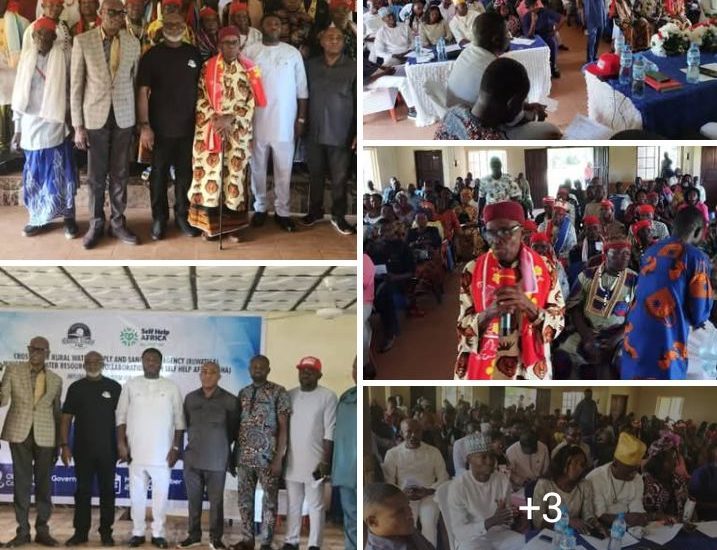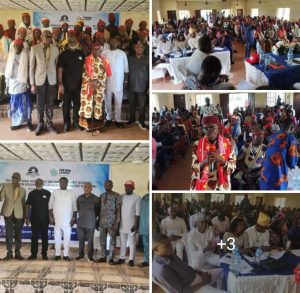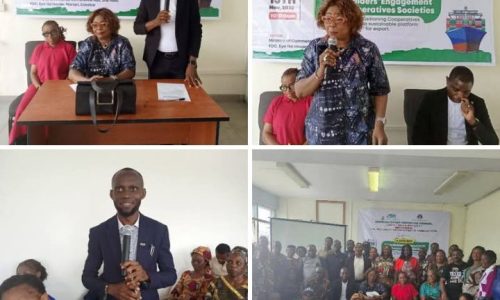C’RIVER LAUNCHES ₦95 MILLION WASH SYSTEMS FOR HEALTH PROGRAMME IN OBUBRA
✓ Government partners Self Help Africa to strengthen rural water systems, restore community confidence, and ensure accountability in sanitation delivery
By The Investigator | EpistleNews
The Cross River State Government has launched the ₦95 million WASH Systems for Health (WS4H) programme in Obubra Local Government Area, a bold initiative to enhance access to safe water and sanitation in rural communities through strong partnerships and accountability.
For residents of Obubra in Cross River State, access to clean water and improved sanitation may soon become a daily reality. This follows the formal launch of the ₦95 million Water, Sanitation and Hygiene Systems for Health (WS4H) programme, an ambitious initiative designed to enhance sustainable water service delivery and promote hygiene across rural communities.
The programme, implemented by the Rural Water Supply and Sanitation Agency (RUWATSSA) in collaboration with the Ministry of Water Resources and Self Help Africa (SHA), took off with a stakeholders’ engagement session at the Obubra Local Government Council Hall on Monday, 27 October 2025.
WATER AND SANITATION AS HUMAN RIGHTS
Declaring the session open, the Commissioner for Water Resources, Barrister Bassey Offiong Mensah, described water and sanitation as “not merely basic needs but human rights and critical determinants of health and development.”
Citing global studies linking nearly 80 per cent of diseases in developing regions to poor water and sanitation, Mensah stressed that investing in WASH was synonymous with investing in people’s dignity and wellbeing.
“Investing in WASH is, in truth, investing in the health, dignity, and prosperity of our people,” he said.
He explained that the gathering was intended to deepen collaboration between government agencies, development partners, and local councils to ensure that WASH systems in the state remain accountable, reliable, and inclusive.
“Our discussions today centre on how to strengthen WASH systems for effective service delivery, align our work with national and global goals, and ensure no community in Cross River is left behind,” Mensah added.
The Commissioner commended Self Help Africa and other partners for their continued collaboration, noting that their interventions have helped position Cross River as a model for sustainable rural water delivery.
“THIS IS NOT BUSINESS AS USUAL” – RUWATSSA GM
In a rare show of commitment, the General Manager of RUWATSSA, Hon Sunday Oko, pledged to relocate temporarily to Obubra to oversee the programme’s success.
“I will relocate to Obubra to make sure the programme works. This is not a Calabar thing, that’s why you see us all here,” he said.
Echoing earlier warnings from the Commissioner for International Donor Coordination, Dr Hippolatus Lukpata, Oko emphasised that the agency would no longer tolerate vandalism or mismanagement of WASH infrastructure.
“Reiterating Dr Hippolatus’ call, I must state clearly, this is not business as usual,” Oko declared firmly.
HIPPOLATUS CALLS FOR ACCOUNTABILITY AND COMMUNITY OWNERSHIP
Also addressing the gathering, Dr Hippolatus Lukpata hailed Obubra for embracing the WS4H initiative, describing it as a progressive step toward rebuilding trust between government and communities.
However, he warned that the sustainability of the project depended largely on local protection of WASH assets.
“Obubra has done well by accepting this project,” he noted. “But the community must protect the infrastructures around them. Anyone caught vandalising WASH facilities should be prosecuted, we have laws.”
He expressed concern that despite once being the first state in Nigeria to record an Open Defecation Free (ODF) Local Government Area, Cross River had lost that feat.
“Our hands must be on deck to regain that record,” he urged.
INTEGRATING WASH INTO DEVELOPMENT PLANS
Representing the State Planning Commission (SPC), Mr Tommy Samuel said the WS4H initiative would be integrated into the state’s broader development agenda.
He explained that poor sanitation and waterborne diseases continue to undermine productivity and community health, noting that the SPC views the new intervention as a catalyst for long-term resilience.
“The WS4H initiative is a vital intervention for building a healthier and more sustainable Cross River State,” he said on behalf of the SPC Vice Chairman and CEO, Dr Bong Duke.
COMMUNITY LEADERS DECRY VANDALISM, DEMAND QUALITY
The Chairman of Obubra Local Government Area, Hon Kingsley Arikpo, expressed appreciation to the state government for selecting his council for the project “without lobbying.”
While welcoming the initiative, he raised concerns over the durability of boreholes and community involvement.
“Some chiefs are destroying and selling those infrastructures; talk to them,” he lamented. “Another issue is the quality of boreholes, some don’t last long after drilling. Please, we need better supervision.”
PARTNERS AND TRADITIONAL RULERS CHARGE COMMUNITIES
Delivering a goodwill message, Mr Ferdinand Anok, Senior WASH Officer at Self Help Africa, urged participants to promote hygiene practices within their homes and communities.
The day-long session featured institution-triggering activities designed to sensitise stakeholders to the dangers of poor sanitation, as well as visioning and assessment exercises for long-term planning.
The Paramount Ruler of Obubra also admonished residents to safeguard public facilities and maintain proper hygiene, affirming that community discipline is key to the project’s sustainability.
OTU APPROVES ₦95 MILLION COUNTERPART FUNDING
It will be recalled that Governor Senator Bassey Edet Otu had earlier approved ₦95 million as counterpart funding for the three-year WASH intervention in Obubra.
The approval, announced in August 2025, underscores the administration’s commitment to extending access to clean water and improving sanitation across all local government areas.
With the WS4H programme now officially launched, stakeholders say the next challenge will be ensuring that accountability, community participation, and system sustainability remain at the heart of Cross River’s WASH reforms.





